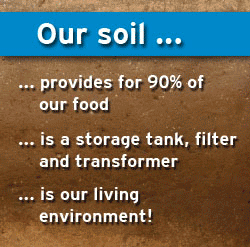Sensibly Use, Carefully Protect our Soil!
The fate of soil? If we are completely oblivious of soil, then soil mostly seems to us to go without saying. As a solid or shapeable ground, as a "bearer" of beautiful, useful and unfortunately also annoying plants, as a space to be bought or sold; as quite a good or bad cycle track and trail – or as a space teeming with cars, which does not leave a gap for one's own car.
Children, gardeners, farmers, scientists, and all people, who take a closer look and contemplate soil more closely, have a lot more to tell about it. About the pleasant scent of forest soil and compost, about the astonishing variety of small and tiny soil animals, about the consistence of soil yielding a good harvest, and so on. Experts have found that in a fistful of healthy soil more living animals are to be found than there are people living on Earth.
It is important to support these „soil co-workers". They achieve enormous achievements. The soil is a filter, a buffer, and a transformer. Organic pollutants are degraded by soil organisms in the course of time. Thus a penetration of pollutants into groundwater can be prevented. The filter and buffer capacity of soils is limited, and it is unequally distinct dependent upon the soil qualities. On account of its function as a storage tank for tracer gas relevant to the climate, and as one of the essential carbon storage tanks of our planet, soil makes a decisive contribution to climate protection.
Dates
26. & 27.3.2014
21st Conference of the Working Community of the Danube Regions
in Tulln an der Donau (Austria)
14. - 16.5.2014
ELSA & SONDAR CZ-AT Conference
in Lednice (Czech Republic)
Contact:
Bernhard Kuderer, MSc.
Soil and Energy Network of European Countries - BIENE Association
kuderer@biene-netzwerk.at
0043 676 751 33 73
Zoltan Füzfa
Municipality of Mosonmagyarovar
zoli@pisztrangkor.hu
0036 2035 620 68





